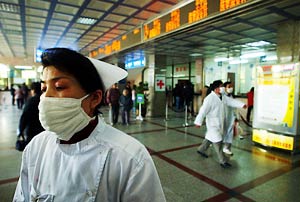 |
| EUGENE HOSHIKO/AP A nurse wears a protective mask at Shanghai's No. 6 People's Hospital |
As panic about SARS spreads in hard-hit Beijing and throughout China's underdeveloped interior, Shanghai has so far appeared strangely untouched by the mystery virus. Local health officials in Shanghai on Thursday reported only two confirmed cases and 16 suspected cases, of which two are foreigners. In contrast, Beijing has reported more than 750 confirmed SARS cases. Wary that foreign investment might flee Shanghai the way it has from Hong Kong, central government officials early this week sent a directive to Shanghai municipal authorities asking city officials to continue promoting what has been touted as essentially a "SARS-free city," a vice-mayoral aide told TIME.
But is Shanghai really in the clear? Doctors in this city of 16 million have begun voicing doubts about the veracity of the government figures. Local medical staff also allege that World Health Organization experts, who are concluding a monitoring trip to Shanghai, are being shown what one doctor at the No. 6 People's Hospital describes as "a sanitized version of Shanghai's SARS problem." A doctor at the Shanghai Contagious Diseases Hospital told TIME that there are more than 30 suspected cases have been admitted to their hospital's facilities, nearly double the official suspected caseload for the whole city. He and other doctors also say that Shanghai's requirements for diagnosing SARS are much more stringent than elsewhere in the world and that if the standards used in, say, Hong Kong were applied in Shanghai, many of the suspected caseload would be shifted to confirmed cases.
At the Huashan Hospital in a leafy district of Shanghai, doctors and nurses confirmed there were seven suspected cases at their hospital, although the hospital's official press liaison says they currently have none. The patients are being kept in a makeshift isolation ward housed in a dilapidated building formerly used for hepatitis patients. Doctors and nurses were not wearing full isolation suits; many were simply wearing four or five simple surgical masks over each other. But on Wednesday, security guards waiting for possible WHO visitors were ushering foreigners to a fancy high-rise building nearby. On the 15th floor of this building, medical staff in isolation suits greeted visitors, while other staff conspicuously sprayed disinfectant around the ward. There were several newly made signs in English pointing out the "respiratory clinic" and other facilities. No such sprucing-up measures, however, had been taken at the makeshift ward where patients were actually being kept.
Meanwhile, at the No. 6 People's Hospital, director He Mengqiao formally denied that there were any suspected cases there, instead maintaining that the hospital was merely a "monitoring station." Yet just 10 minutes earlier, another doctor who mistakenly assumed a reporter was affiliated with the WHO, showed X-rays of a 14-year-old patient suspected of having the disease. He said that other students at the patient's school in Xuhui district were also running fevers and were being monitored.
Also on Wednesday, top Shanghai Communist Party officials met with local official media to discuss the city's SARS situation. The meeting was classified as "neibu," or internal, meaning that the information would not be disseminated to the public. Officials told the gathered media that Shanghai would not escape the SARS epidemic, despite previous public assurances to the contrary. The party cadres also said that the WHO had told them that the U.N. agency did not believe the government figures of only two confirmed cases. Large-scale events in the city were to be cancelled, and Shanghai's much-vaunted auto exhibition was closed early after rumors that SARS-positive patients had visited the show. The media were instructed to ramp up a SARS public education campaign, so city residents would know how to prevent the spread of the virus.
But party officials then cautioned that "Shanghai's SARS caseload was still a state secret," according to one journalist who attended the meeting. The state media was not to report any SARS statistics higher than the government-sanctioned figures, nor were Shanghai journalists allowed to interview any SARS patients or their families. "Readers are going to be very confused," complained the journalist. "On the one hand, we tell them there are almost no cases in Shanghai. On the other hand, we tell them that they must be very vigilant in avoiding the disease. But if Shanghai has barely any cases, why does the public need to be worried about SARS?"
http://www.time.com/time/asia/news/daily/0,9754,446260,00.html
Category: Falun Dafa in the Media





